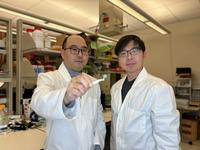Hardware security is an ever-growing problem in healthcare with wearables and medical devices due to hyperconnectivity.
Security is not a new problem in the devices we wear and use every day.
Hardware security is an ever-growing problem in healthcare with wearables and medical devices due to hyperconnectivity. Young Kim, Professor and Associate Head for Research, and Jung Woo Leem, Research Scientist, at the Weldon School of Biomedical Engineering, offer a solution in a recently published paper, Heteronanostructured Field-Effect Transistors for Enhancing Entropy and Parameter Space in Electrical Unclonable Primitives in ACS Publications.
A physical unclonable Function (PUF) is a hardware security primitive, acting as a digital fingerprint for each device. Prof. Kim’s lab has pioneered the development of cyberphysical biomedical security technologies and has reinvigorated the concept of PUFs to offer a promising hardware security solution.
The paper demonstrates that heteronanostructured semiconductor materials can be used as the main building blocks of high-security electrical PUFs as enhanced entropy and parameter space sources—making healthcare wearables and medical devices safer from cyber-attacks and keeping patient’s information secure.
The research was conducted in collaboration with the Korea Research Institute of Standard & Science (KRISS) and the US Air Force Research Lab.
Click here to read the paper.


